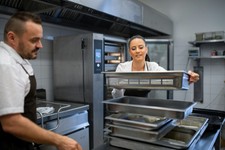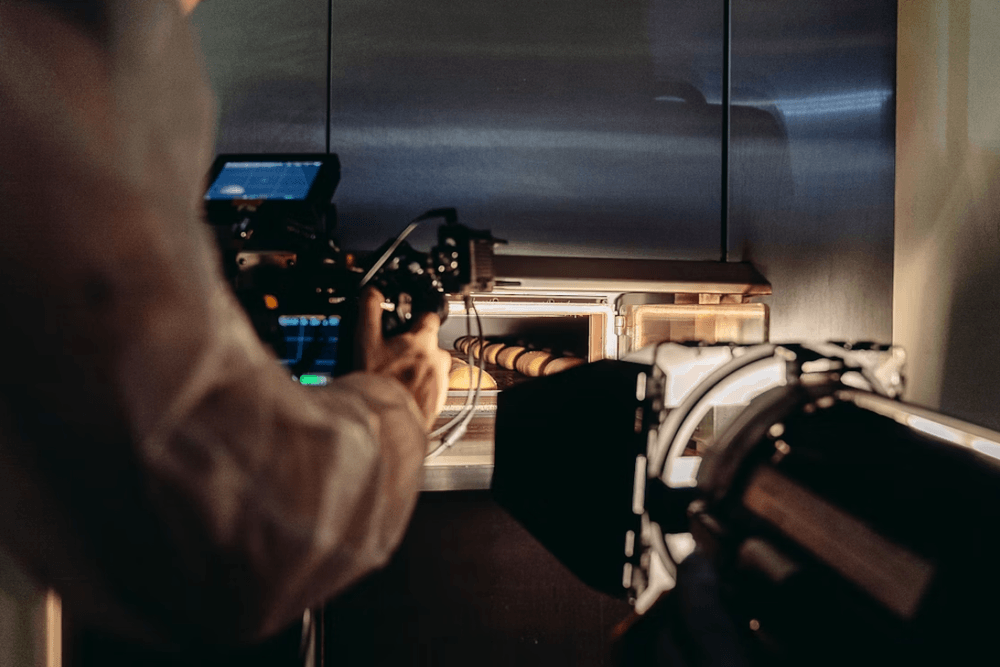What is a Commercial Kitchen Hourly Rental? Your Guide to Flexible Space
Table of Contents
CloudKitchens
How many tacos can be delivered from a 1000sqft restaurant?
The same amount as a 200sqft ghost kitchen.
Launching or scaling a food business no longer requires building out a costly kitchen from scratch.
The rise of commercial kitchen hourly rental gives food entrepreneurs, from startup caterers to bakers, pop-up chefs, and food truck operators, a more affordable and flexible way to produce, test, and grow.
By renting a kitchen by the hour, you gain professional equipment, regulatory compliance, and a risk-free entry point, all without a long-term commitment.
What is a commercial kitchen hourly rental?
Commercial kitchen hourly rental means booking a licensed, fully equipped food prep space for a specific number of hours, whether for a one-off production run, ongoing weekly slot, or last-minute event needs.
Unlike long-term leases or owning a kitchen, you only pay for the exact time you use, giving maximum flexibility and scalability. These kitchens are often shared facilities used by multiple food businesses, each reserving their own time slots.
Read more: How much does it cost to rent a Commercial Kitchen? Everything you need to know!
Key advantages of hourly kitchen rental
1. Lower start-up costs
By renting a kitchen by the hour, you avoid the high initial investment in construction, equipment, and permits. This reduces entry barriers for startups and enables established brands to test new products without substantial risk.
2. Flexibility
Hourly kitchen rental near me lets you book as much or as little time as you need, whether it’s for nightly prep, weekly bakes, or seasonal holiday surges. This pay-as-you-go model supports businesses with variable or unpredictable production schedules.
3. Professional equipment
Rental kitchens come loaded with industrial-grade equipment, ovens, ranges, mixers, refrigeration, prep tables, and dishwashing stations, enabling greater efficiency and quality than most home or small-scale setups could ever provide.
4. Built-in compliance
Regulatory compliance is critical in the food industry. Commercial kitchens are regularly inspected, insured, and meet health department standards. By operating in these facilities, you gain a shortcut to legal operation without slogging through licensing hassles yourself.
5. Community and support
Many shared kitchens foster a collaborative environment. Network with other food entrepreneurs, take advantage of shared storage or logistics, and occasionally tap into mentorship and market insights from kitchen managers or fellow tenants.
Read more: Ghost Kitchens: everything you need to know before starting
What does it cost to rent a commercial kitchen by the hour?
Hourly rates for commercial kitchens typically range from $15 to $75 per hour, depending on location, amenities, and equipment. Major city kitchens (e.g., New York, Los Angeles, or San Francisco) tend to sit at the higher end of the spectrum, while suburban or rural kitchens can be as affordable as $15 to $30 per hour.
| Location Type | Typical Hourly Rate |
| Urban | $40–$75 |
| Suburban/Rural | $15–$30 |
| Specialized/Commissary | $30–$65 |
Other possible fees:
- Membership fees: Some kitchens require a monthly or annual membership along with your hourly bookings, covering maintenance, scheduling, and basic supplies.
- Storage fees: Dry, cold, or frozen storage may cost extra if you need space to leave ingredients or finished product between sessions.
- Security/cleaning: Some require deposits or charge for deep cleaning if extra mess is left behind.
- Insurance: Businesses often need liability insurance, adding $500–$2,000 per year.
Read more: Expand your wholesale kitchen efficiently with these cost-saving tips
Typical use cases for hourly kitchen rental
Hourly kitchen rental provides the flexibility to access fully equipped, licensed kitchen space only when your business truly needs it. Whether you’re managing a bakery ramping up for the holidays, a caterer prepping for weekend weddings or a pop-up launching a new culinary concept, hourly kitchen rentals enable you to use professional facilities without the commitment or risk of permanent ownership. Some uses are:
- Caterers and food trucks: Prep for daily events or farmer’s markets without committing to a full-time lease.
- Bakers and meal prep businesses: Access ovens and equipment just during production runs.
- Startups and pop-ups: Test products or small-batch menus before scaling up or signing long-term contracts.
- Holiday and event specialists: Accommodate peak season demands and overflow work without overspending in slower periods.
- Food product makers: Prepare jams, sauces, or baked goods in a certified kitchen to sell at retail or online.
Read more: Optimizing festival operations: a comprehensive guide to ghost kitchen logistics
How CloudKitchens makes commercial kitchen hourly rental easy and seamless
CloudKitchens takes the complexity out of finding and managing dedicated commercial kitchen space. With a network of turnkey, health code-compliant kitchens positioned in key urban and suburban markets, you gain access to professional spaces exactly when you need them.
With CloudKitchens, every space is fully outfitted with industrial equipment, ample prep zones, and the highest safety and compliance standards. Our facilities are designed for equitable access — startups, pop-ups, and established brands can all customize their usage with supportive facility management and clear pricing.
As your business expands, you can move from hourly to full-time rentals or even open new locations, ensuring your kitchen solution always matches your ambitions.
Ready to discover the flexibility of commercial kitchen hourly rental? Contact CloudKitchens to explore options near you and unlock the professional kitchen facilities that can turn your food business dreams into reality.
DISCLAIMER: This information is provided for general informational purposes only and the content does not constitute an endorsement. CloudKitchens does not warrant the accuracy or completeness of any information, text, images/graphics, links, or other content contained within the blog content. We recommend that you consult with financial, legal, and business professionals for advice specific to your situation.
More insights & stories
There’s more where that came from.
Get in the know and check out our additional insights



